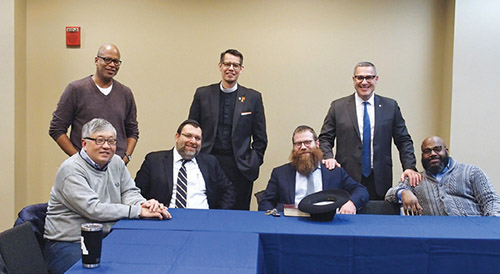


It’s easier to ask for help, or partners, if you already know the people you want to reach. That’s the thinking behind Englewood Mayor Michael Wildes’ new cultural affairs committee, an umbrella designation with sub committees in clergy, arts and entertainment, commemoration, community engagement, economic development and wellness.
“I’m shocked by how many resourceful and talented people we have in Englewood,” Mayor Wildes said. “The more we can bottle this beautiful cholent, the better it tastes,” he quipped.
Wildes said he wanted to create a structure in which people who can make things happen get to know one another, so that when there is a problem or a need, the group can swing into action. For example, a family was recently displaced by a fire and there was an ad hoc outpouring of help. An organized group could respond more thoroughly.
The clergy committee brings together a very diverse group: an imam, several pastors and the rabbis of all the shuls in Englewood. “It’s a shortcut to trust in the community,” said Wildes. “When the rabbi and the pastor are in the same room, people see the common denominators.” The agenda of issues for the committee to brainstorm includes food security, establishing a community center, homelessness, identifying youth at risk, multicultural enfranchisement, opioid use and proposed marijuana legislation.
The clergy committee met for the first time at Congregation Ahavath Torah on February 11, with Rabbi Chaim Poupko, Rabbi Shmuel Konikov and Rabbi Zev Reichman. Other clergy present were Reverend Richard Hong, Father William Allport, Pastor Preston Thompson and Pastor Eddie Spencer. Wildes got the conversation started by acknowledging that the purpose of the group was to create more opportunities for people to get to know each other and know more about each other. Soon, the group was talking about needs in the community, projects their own congregations were involved in and how they might plan an event as a committee to provide support for an organization and encourage all their congregants to join in.
In an interview prior to the meeting, Rabbi Konikov said he was happy to get involved when Wildes told him about the committee and asked him to join. “It’s good to have a sense of unity, to work together for the greater good of the community,” he said. “The benefit of getting to know clergy members is important. If something arises, it’s always important to have a relationship.”
Rabbi Konikov doesn’t shy away from the problems he sees. “It’s important for the clergy to come together to implement food drives and humanitarian efforts and do it in unison, on the same page, not just one synagogue but the entire community, with one goal—to tackle the issue. Another priority for the clergy committee is the importance of looking out for youth at risk, coming together to help as much as possible.”
Rabbi Konikov has a unique view of Englewood; he grew up here, moved away and returned four months ago to grow a Chabad presence. “Englewood has changed; it’s grown,” he observed. “There are lots of young families and many buildings have gone up. The kids and grandkids of people I lived with are now having families of their own here.”
Chabad’s main purpose is to bring a sense of excitement about Judaism to Jews all over the spectrum, from non-affiliated to observant. “Growing up in Englewood, I was able to envision how much Chabad can bring to the community,” he said.
Rabbi Konikov said Chabad is very focused on chesed; they are already doing food drives and visiting nursing homes. So serving on the clergy committee is a natural fit. “Chabad is ready to help wherever needed.”
By Bracha Schwartz
�









